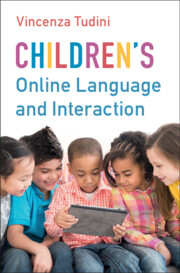Book contents
- Children’s Online Language and Interaction
- Children’s Online Language and Interaction
- Copyright page
- Dedication
- Contents
- Figures and Tables
- Preface
- Acknowledgements
- Transcription Conventions
- 1 What Is Talk and Why Do Children Need It?
- 2 Beyond Emotions: Emoji Talk
- 3 Penguin Talk
- 4 Video Game Talk
- 5 Minecraft Interaction
- 6 Children’s YouTube Comments on Ethan Gamer
- 7 Online Grooming Talk
- 8 Summary of Findings, Implications, and Guidelines
- Appendix: Data Table
- References
- Index
2 - Beyond Emotions: Emoji Talk
Published online by Cambridge University Press: 19 December 2024
- Children’s Online Language and Interaction
- Children’s Online Language and Interaction
- Copyright page
- Dedication
- Contents
- Figures and Tables
- Preface
- Acknowledgements
- Transcription Conventions
- 1 What Is Talk and Why Do Children Need It?
- 2 Beyond Emotions: Emoji Talk
- 3 Penguin Talk
- 4 Video Game Talk
- 5 Minecraft Interaction
- 6 Children’s YouTube Comments on Ethan Gamer
- 7 Online Grooming Talk
- 8 Summary of Findings, Implications, and Guidelines
- Appendix: Data Table
- References
- Index
Summary
Chapter 2 provides an overview of how emoticons and emojis are a human adaptation to online written conversation to compensate for the absence of non-verbal cues and physical context, but also an affordance of most written conversation to promote affiliation, creativity and play. The analysis highlights the role of emojis as ‘attendant activities’ (Jefferson, 1987) which express politeness (and impoliteness) and other pragmatic functions, including prosocial and anti-social behaviours, identities, contextualizations (physical/virtual), irony and meaning enhancement. By analysing the multiple, often overlapping interactional functions of emoticons and emojis, this chapter provides original insights into the unique role of emojis in children’s written conversation, highlighting some major differences between spoken and written interaction. Findings indicate that emojis fulfil interactional functions which go beyond simply replacing fundamental non-verbal, voice and contextual resources which are available to speakers in phone and face-to-face interaction. While further research in this area is required across different age groups and genders, the various categories of emojis identified in this chapter provide a comprehensive account of how children are likely to deploy and respond to these symbols in online interaction, and how multiple meanings are possible depending on the interactional context
Keywords
- Type
- Chapter
- Information
- Children's Online Language and Interaction , pp. 27 - 56Publisher: Cambridge University PressPrint publication year: 2025

